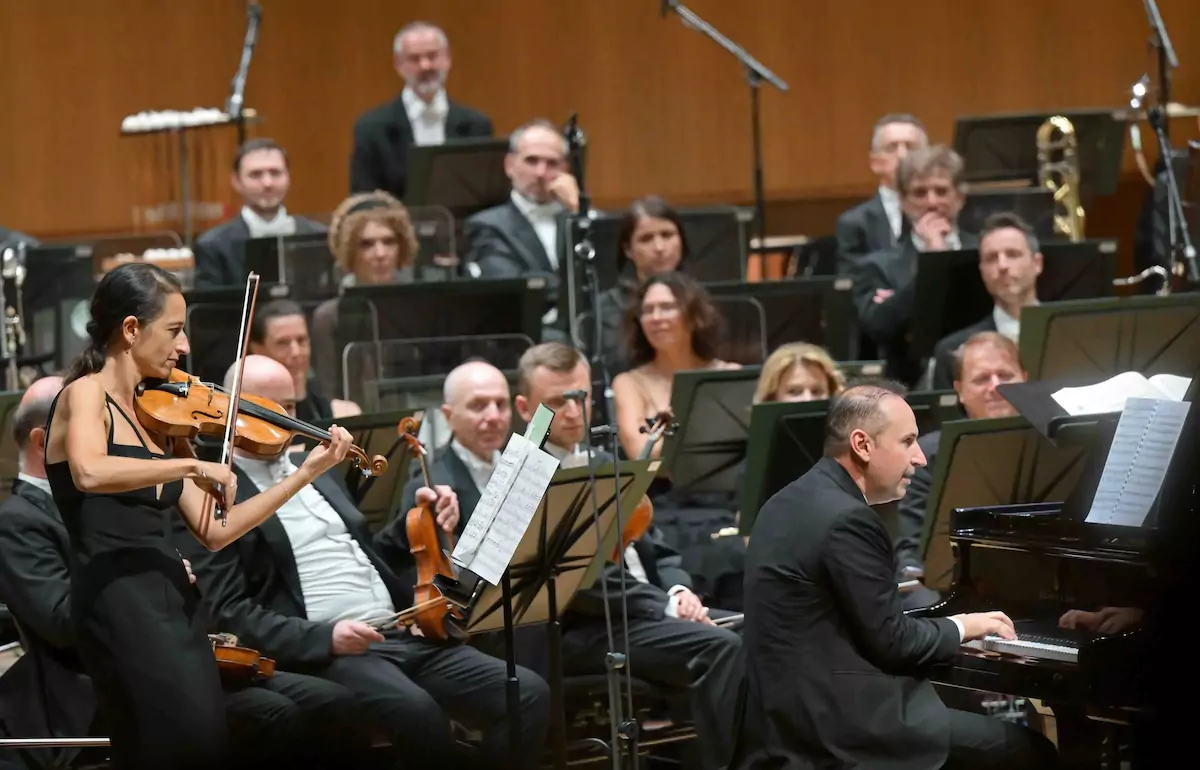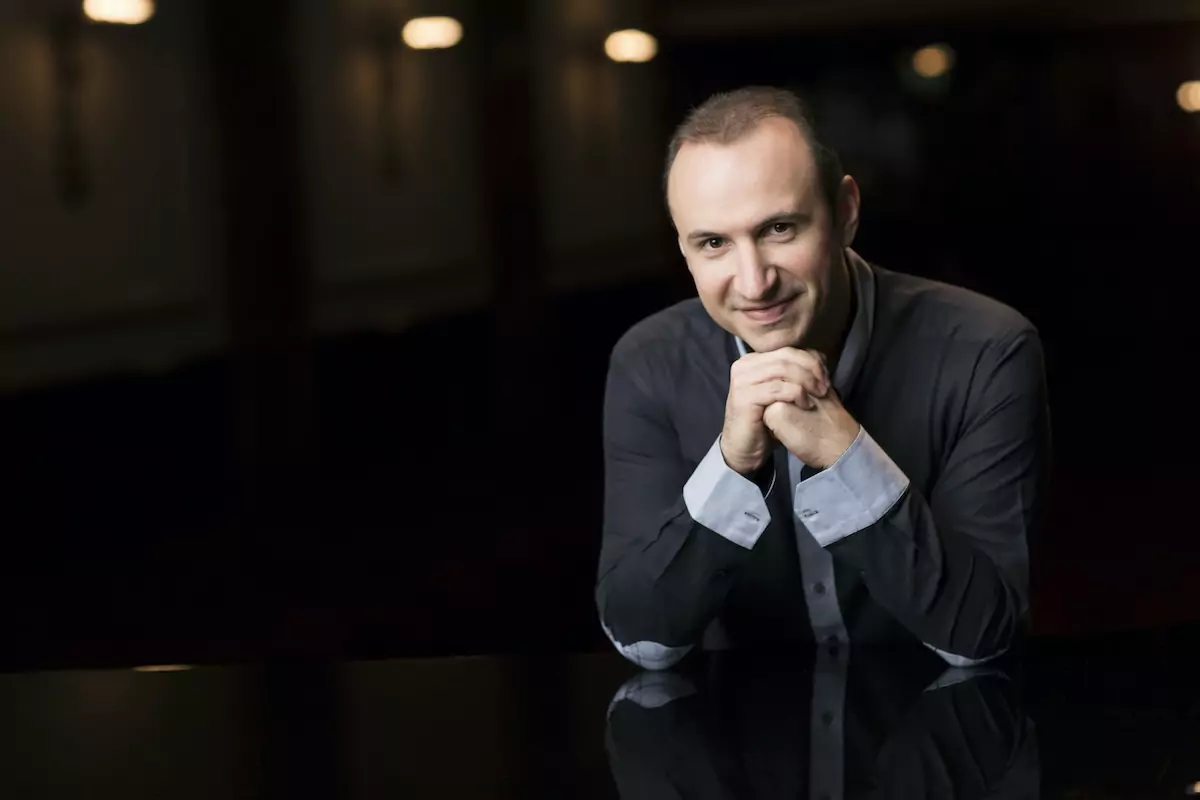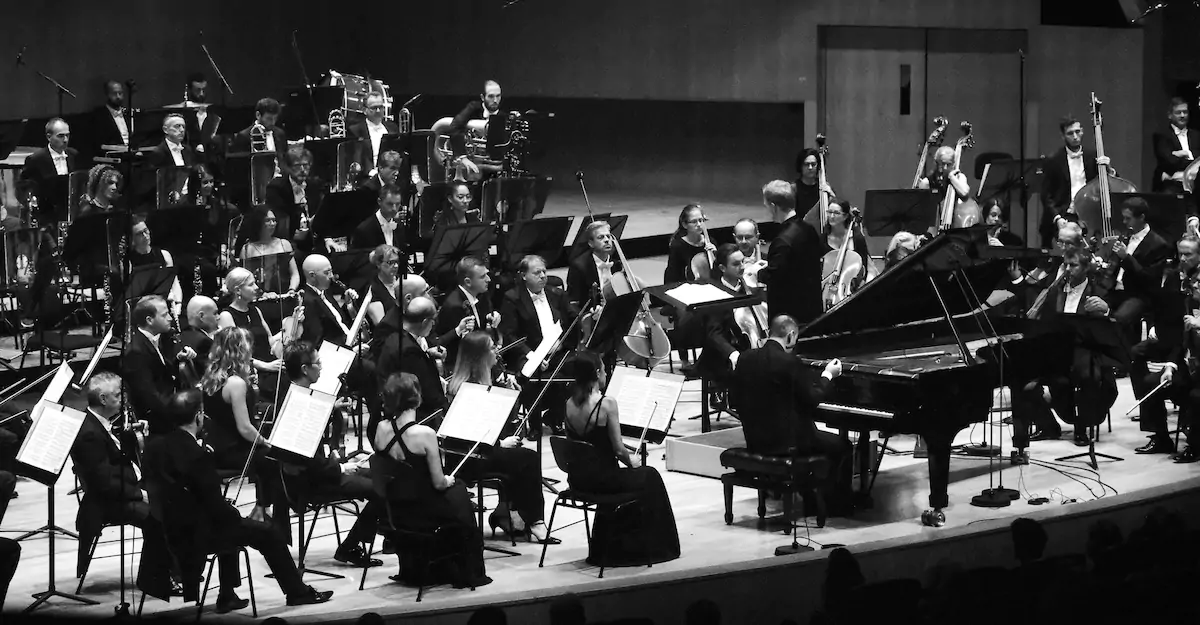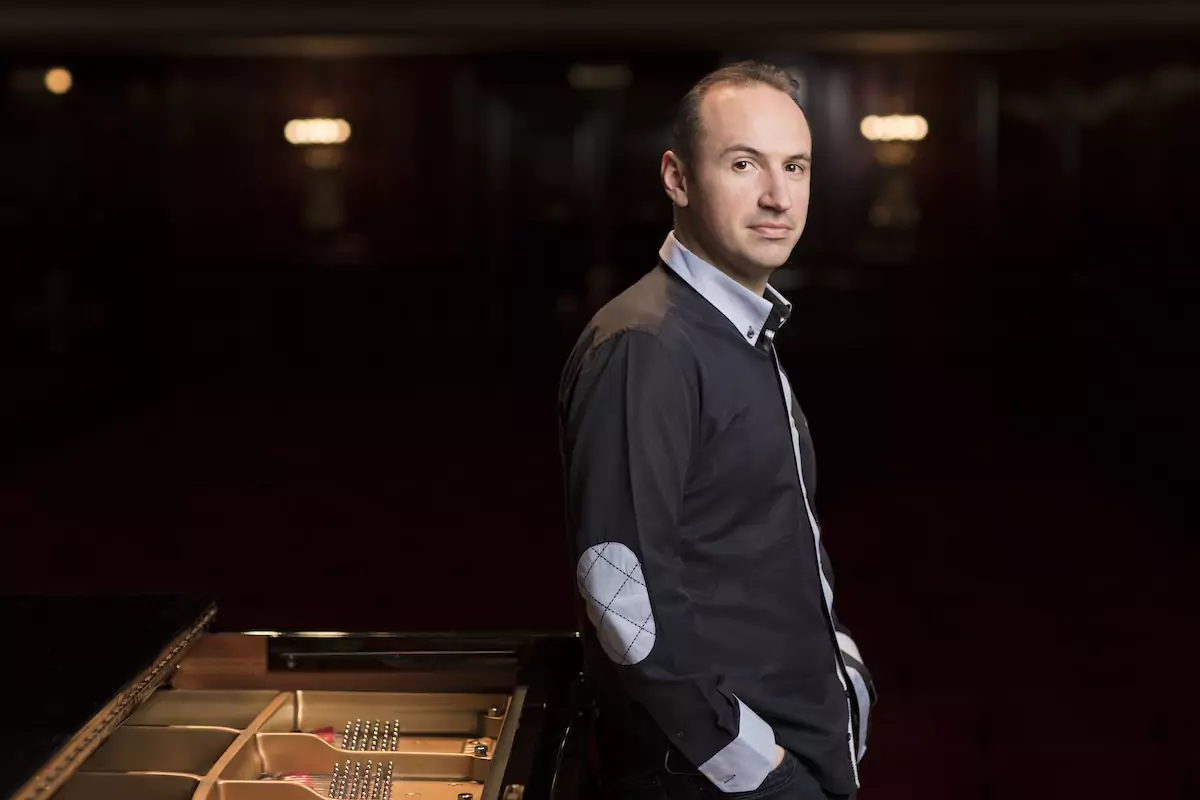Simon Trpčeski shares with Monaco Life’s Celina Lafuente de Lavotha his remarkable journey from a modest upbringing in Macedonia to achieving global acclaim as a classical pianist, and his current role as Artist in Residence with the Monte-Carlo Philharmonic Orchestra.
Simon Trpčeski, born in Skopje, Macedonia, in 1979, is a highly talented classical pianist. For this, the 2023-2024 season, he holds the esteemed position of Artist in Residence with both the Orchestra Philharmonic of Monte-Carlo and the Royal Scottish National Orchestra. He is widely acclaimed for his exceptional virtuosity, profound expressiveness, and compelling stage presence.
The youngest of three children, Simon’s parents came from modest families in West and East Macedonia villages. They were all passionate about music, even though they were not able to study it academically. Simon says that his talented mother could have had a successful singing career. His father played a four-string instrument called the Tambura, comparable to a cithara.
Simon received his music diploma in 2002 from the University of Saints-Cyrille-et-Methode of Skopje. Even before graduating, he had already won prizes in international competitions. He has collaborated with world-famous conductors at Philharmonic Orchestras in New York, San Francisco, Los Angeles, Singapore, Hong Kong, and Toronto. Additionally, he has given recitals in the USA, Europe, and Asia and has played with English orchestras in London, Bournemouth, Stockholm, Bergen, and Helsinki.
Monaco Life’s Features Journalist Celina Lafuente de Lavotha spoke with Simon Trpčeski about his background, his journey to becoming a classical pianist, and the significant moments in his ascending career such as receiving the Diapason d’Or award.

Monaco Life: What are the stand-out memories of your childhood?
Simon Trpčeski: My childhood holds some of my most cherished memories. It played a crucial role in shaping my personality and was filled with warmth, music, and happiness during gatherings with friends and family. People knew how to find joy in the little things in life. However, my humble family upbringing kept me rooted and connected to my heritage, setting the foundation for a purposeful life, and helping me become a good and compassionate human being. Pavarotti once said, “We had so little, but no one had more than us.
I remember pretending to play the accordion using an ashtray while watching folk music shows on TV. My father noticed and bought me a small accordion as a gift. I started creating melodies with my right hand and later began taking lessons. Initially, music school didn’t teach me how to play the accordion, so the piano became the most similar instrument to me. That marked the beginning of my journey as a pianist.
What are your interests outside of music?
I enjoy simple pleasures such as spending time with my family, reading to my kids, taking nature walks, swimming in the sea, watching football (both on TV and in person), watching movies (especially comedies and animated ones), visiting museums and theatres, and experiencing new places and cultures. These activities nourish the soul.
I’ve also had success composing pop songs and children’s songs. My daughter, Lara, even represented Macedonia at the Junior Eurovision with a beloved song. I have a great love for life, and simplicity is genuinely remarkable.
Who inspired you to pursue a professional career as a pianist?
I loved music and the piano, but did not actually think about making it a professional career. The Romanov couple, teachers from Moscow, moved to Macedonia at the dissolution of the Soviet Union and Yugoslavia in 1991, and I started to take more serious steps in my early education. Boris Romanov studied briefly with Konstantin Igumnov, who premiered the Rachmaninov Sonata. Later, he studied with Yakov Milstein, Richter’s close friend. I am proud to say that I was educated in the spirit of the good old Russian school that is rare nowadays. They both came from a disciplined educational mentality, which was uncommon for the Balkans but certainly produced excellent results.
Coming from a modest country, neither powerful, nor politically well positioned, nor important classical music-wise, with still ongoing transition due to world politics, the only way for me to develop and see the realities of my level within the general level was through competitions. I had yet to have other chances or connections.

So, after the London International Competition prize, I started working with management, which opened the path. I am indeed grateful to my family for their unconditional support even under a difficult financial situation, to my teachers for the right direction in the performance, and to those rare unique people for their support at the start of my development, when very few could recognise natural talent.
Concert pianists have an air of intrigue, as they are usually alone on the stage with their piano as their only company. Do you think pianists are more detached than other classical musicians?
In a way, yes, but it depends on how one looks at it. The piano is the most orchestral instrument in one piece. Therefore, it provides an immense opportunity to enjoy various sounds, volumes, and textures, which could be interpreted as an allusion to being detached and becoming a whole ensemble by yourself. It may sound funny or selfish, but it is true.
I do enjoy playing music with an orchestra because it’s a magical way to connect with people. However, I don’t mind playing solo recitals because it’s when you feel like the king of the stage and the whole world is yours. I had this exact feeling during my recital in Monaco, and I was thrilled that the enthusiastic audience there received it so well.
Which performances and recordings are you most proud of?
It is a challenging question. I have the same attitude toward every performance or recording: high professionalism, dedication, and love. There are certainly some moments that proved to be fragile due to cultural or personality differences or personal situations, so I could say that my graduation performance of the Tchaikovsky Concerto, the German debut in Berlin with Ravel concerto, the recording of the Rachmaninov and Debussy recitals, as well as the Variations (Mozart, Beethoven, Brahms) recital album, Rachmaninov 3 with the New York Philharmonic, Rach 4 in Paris, Brahms concertos with WDR Symphony, are among them. I am sure there are a few more, but all of them remain a constant and inevitable inspiration and motivation.
Each concert has a special meaning to me, so all of them are impressed in my memory. Having performed in Europe, the US, China, Japan, Australia, New Zealand, Brazil, and Argentina, judging one more memorable than the other would be unfair.
I love variety in life. Therefore, I do approach diverse repertoire. I am proud to hear French nationals being highly satisfied when I interpret French composers, the same as Germans, Russians, Americans, Norwegians, or Polish when I interpret theirs. There cannot be a better compliment than getting positive feedback from fellow citizens. I am a romantic; you can find romanticism from Bach onwards and before him. Lucky me! (smiles)

Tell us about your experience as Artist in Residence with the OPMC…
I am honoured that the OPMC chose me as its Artist in Residence. The opportunity to share a diverse repertoire with the orchestra and the audience gives me lots of pleasure, especially in the beautiful reception of the appreciative public.
The welcome from the orchestra and the public at my first concert this season was fantastic. I enjoy playing with different sounds, colours, and intensities of emotions, which is what I felt when playing with the OPMC. They are open to collaborating and sharing the moment on stage.
I look forward to my last concert this season interpreting such a colourful, authentic, and monumental concerto such as Brahms no.2, and the highly anticipated reunion with Maestro Yamada after a few years, at such a mythical place like the Prince’s Palace Honour Court, a first time for me.
I was especially delighted about the public’s reception of my world music project, Makedonissimo (very Macedonian), which we presented for the Orthodox New Year. It involves a quintet, a chamber view of Macedonian folk music that includes a piano, a violin, a cello, a clarinet, a saxophone, a kaval, and a whole set of percussions.
Do you have a favourite concert venue?
I am an easily adaptable person. I do love concert halls everywhere, but I also love churches, and I enjoy playing in outdoor venues. Recently, I had a chance to play in the rural surroundings of my father’s village in the middle of the mountains, or as the people would say – in the middle of nowhere- for the pre-premiere of Makedonissimo in Macedonia, and that was quite a memorable experience, kind of like Woodstock. If we are positive and look on the bright side, there can be opportunities everywhere to create and share the magic with the audience.
What did it mean for you to receive the Diapason d’Or award for the recording of Rachmaninov in 2010?
It was exhilarating! You know, there were also wonderful reviews such as a reference recording in Germany, or Best Beethoven solo performance at the BBC Music Magazine, Adagio, and a couple of more music magazines for the Variations album where I recorded Beethoven and Mozart for the first time, or wonderful reviews for the Makedonissimo project, and so on. It is a welcome proof of an artist’s work and dedication. So, a prestigious award such as Diapason d’Or, which comes from the sophisticated taste of the French music critic, without any other pressure than the music itself, means the world to me! I am deeply grateful for that, motivating me to progress further. Sometimes, recordings do not reach magazines. I would be happy to hear more about the Debussy Album I recorded for EMI Classics a long time ago, for example. I would learn a lot from it.
Monaco Life is produced by real multi-media journalists writing original content. See more in our free newsletter, follow our Podcasts on Spotify, and check us out on Threads, Facebook, Instagram, LinkedIn and Tik Tok.
You may also like:
